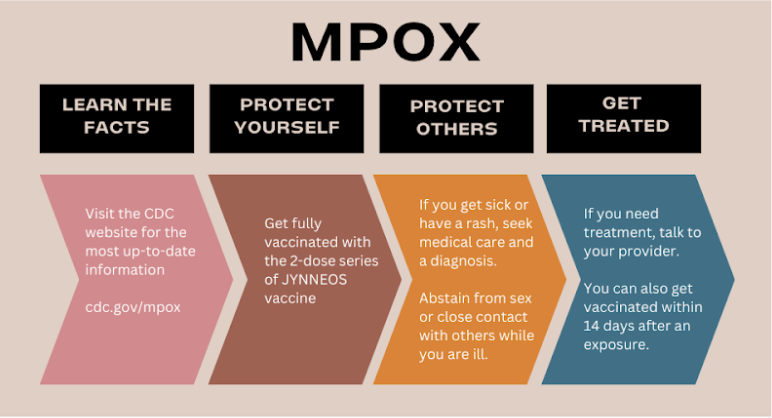MPOX
(Formerly known as Monkeypox)What is mpox?
Mpox (formerly called monkeypox) is a rare disease caused by the mpox virus. Previous to 2022, it was a rare viral infection endemic to Central and West Africa, and was rarely seen in those who traveled outside of these regions. Since May 2022, however, the Centers for Disease Control and Prevention (CDC) has been monitoring an outbreak of mpox that has spread across multiple countries that don’t normally report the disease, including the U.S. Symptoms of the disease are similar to smallpox symptoms, but milder, and rarely fatal.
At this time, the risk for most people in the U.S. remains low as the disease is largely transmitted through close, intimate contact. Most people in the recent U.S. mpox outbreak have reported close, intimate, or sexual contact with a person infected with mpox.
The best way to prevent mpox is to get vaccinated with the two-dose JYNNEOS vaccine series. Vaccination is not 100% protective against infection but, if a vaccinated person gets mpox, the disease is generally very mild.
People living with HIV who are not on HIV treatment, particularly with CD4 less than 200 and/or uncontrolled virus, may be at increased risk for more severe mpox. CDC continues to gather information about HIV and mpox.
The CDC has extensive information for individuals and for healthcare professionals. These sites are updated regularly.
You can also review Arizona’s Mpox webpage and Mpox Data Dashboard.
Information for Individuals:
Click here for more mpox information for individuals.
- What to do if you’ve been exposed to Mpox
- Common Mpox symptoms
- What to do if you have symptoms of Mpox
Information for Healthcare Providers:
https://www.cdc.gov/poxvirus/monkeypox/clinicians/index.html
Safer Sex and Social Gatherings:
Vaccination is an important tool in preventing the spread of mpox, but it isn’t 100% effective but does lessen disease severity if infection occurs. Another way to reduce your risk for mpox is changing some parts of your sex life to reduce the risk of exposure to the virus. This is especially important if you are not vaccinated, or if you have only received one dose of the vaccine or if it has been less than two weeks since your second dose of vaccine.
Learn more about safer sex and social gatherings at this CDC webpage.
Additional Mpox Information in Spanish:

